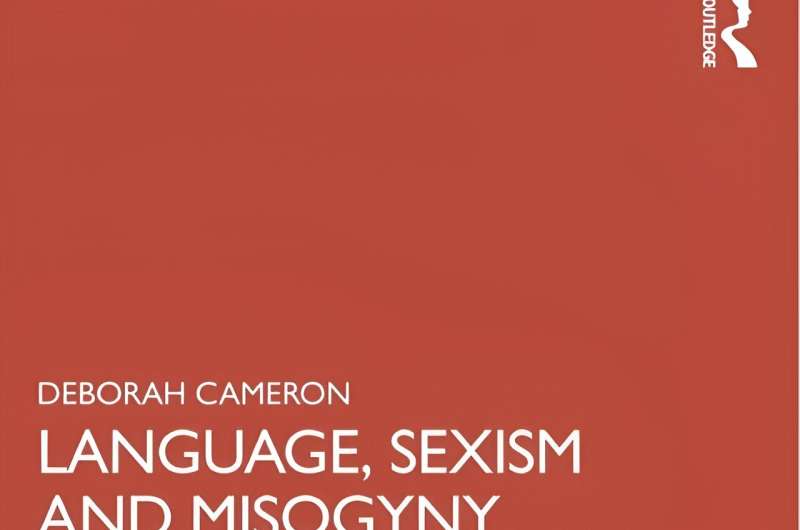This article has been reviewed according to Science X's editorial process and policies. Editors have highlighted the following attributes while ensuring the content's credibility:
fact-checked
trusted source
proofread
Internet is fueling new wave of misogyny, says linguistics expert

Society has gone backwards in its treatment of women with the internet fueling new forms of misogyny, according to the author of a new book.
Linguist and researcher Deborah Cameron says that prejudice, discrimination and abuse should not be regarded as yesterday's problems. Rather than fading away in the twenty-first century, they have evolved in ways that reflect today's conditions, her research suggests.
Her book "Language, Sexism and Misogyny" analyzes the way sexism and misogyny are expressed today in advertising and media, drawing on evidence from academic research to provide a comprehensive account of how language is used to undermine and abuse women.
Andrew Tate, Donald Trump, the rise of the "tradwife" and the "manosphere" are all referenced in the book along with female public figures who have faced sexism such as Kamala Harris and Greta Thunberg.
Social media and sexism
"The return of overt misogyny is visible both in politics and in popular culture," says Professor Cameron.
"Though the misogyny of the twenty-first century is politically backward-looking, its style and mode of expression belong to the present."
Professor Cameron analyzes how the rise of TikTok and various other forums that allow space for the promotion of misogynistic ideas have led to a rise in verbal threats and abuse online against women.
"Surveys consistently find that most women who use the internet have some experience of online abuse, just as most have some experience of being harassed offline, on the street or on public transport," she explains.
Much attention has been paid in the media to Andrew Tate's role in encouraging extreme masculinity in young men.
Professor Cameron says his beliefs are "dehumanizing" but argues it is too simplistic to suggest he is the root of the current problem with young men and misogyny. Instead, she suggests that the extreme misogyny promoted by influencers like Tate overlap with more "ordinary and unremarkable" attitudes expressed in mainstream advertising, comedy and news reporting.
The impact on women
Professor Cameron argues that the barrage of misogyny against women has wider implications, as it affects how women participate in politics and society at large.
She explains, "For some women—those who have a high public profile, for instance in politics, political activism or the media—it has become a more serious problem.
"There's growing concern about the effect this is having on women's participation in politics and public life. Though they are no longer excluded in the ways they were a hundred years ago, the reality or the fear of being bombarded with rape and death threats is leading many to exclude or remove themselves."
This is compounded by other behaviors towards women, and the book includes research to show that women are granted less speaking time than men, a trend that Professor Cameron calls "the gendered economy of attention."
"Language, Sexism and Misogyny" also highlights how women's language is "policed"—they are criticized both for being unassertive and for being "strident." Kamala Harris and Hilary Clinton are among those who have faced this double standard, according to the author.
The fight back
Although Professor Cameron points out that new developments in artificial intelligence (AI) are amplifying sexism and misogyny, she points to evidence of women fighting back.
She shows how language has been used to fight back against sexism and misogyny—for instance, by inventing new terms, "reclaiming" old slurs, and campaigning for changes in media reporting, dictionary entries or the language used in job advertisements.
Professor Cameron adds, "Sexist and misogynist language is everywhere, it's insidious, and in an age when we're often told it's no longer a problem the forms it takes can be subtle. To fight it we need to be able to see it and understand how it works, and that's really what this book is for."
Provided by Taylor & Francis





















